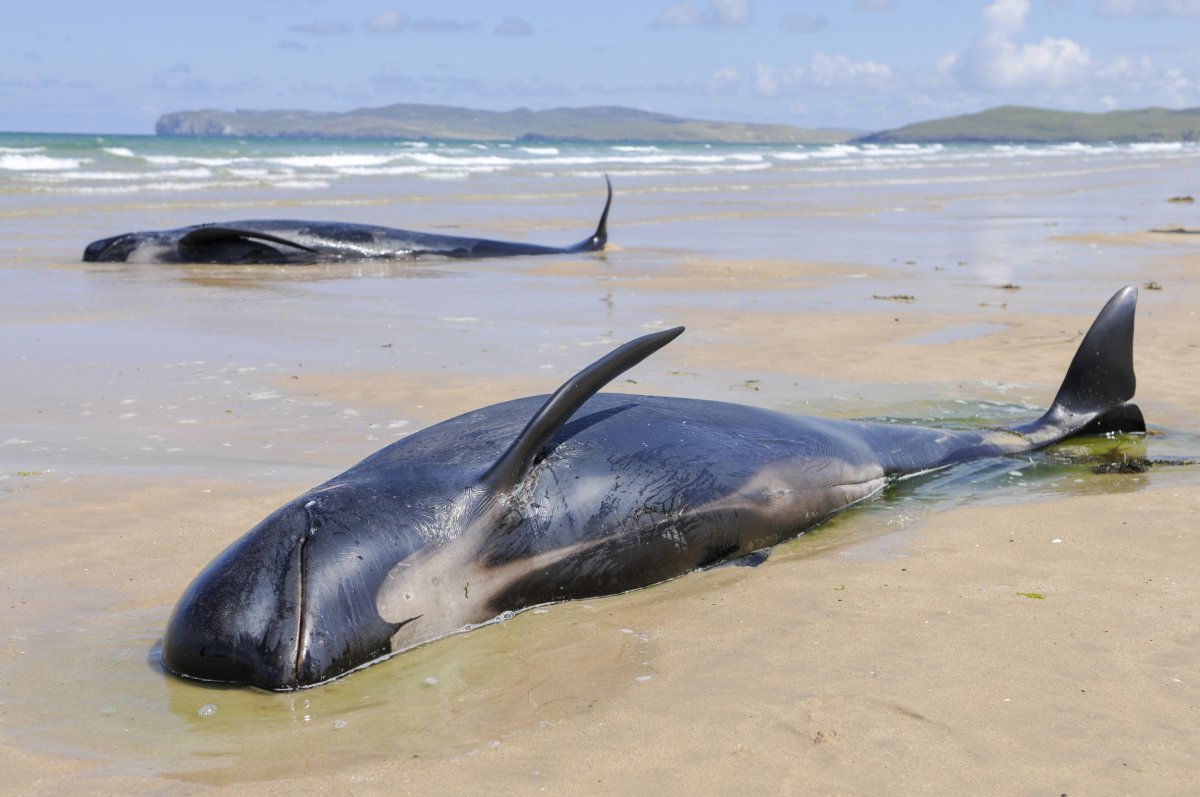The mystery of why mass whale strandings occur has deepened.
Researchers at Aberystwyth University in the United Kingdom have found evidence that stranded pilot whales in the northeast Atlantic and the Falkland Islands were from different family groups. This contradicts scientists' previous theories about the phenomenon.
Cetacean strandings—when marine mammals wash up on beaches—can be fatal. Long-finned pilot whales are among the species most affected, along with other types of dolphin.
Scientists have previously suspected that these socially complex animals become stranded as they attempt to maintain family cohesion.

The whales spend most of their lives in family pods, where all the members are related to one female, meaning they may get stranded in desperate efforts to stay together when they find themselves in difficult waters.
The Aberystwyth scientists, working with researchers from the Falkland Islands Fisheries Department, the universities of Glasgow, Chester and Utrecht, the Galway-Mayo Institute of Technology and the Scottish Marine Animal Stranding Scheme, obtained and analyzed samples from mass stranding events in the northeast Atlantic and the Falklands.
They discovered that most of the stranded whales were not related to each other, suggesting strandings were down to family disruption rather than cohesion.
"Genetic analysis indicates the role of family dynamics in strandings is different than previously thought," Niall McKeown, a lecturer in marine biology at Aberystwyth University and member of the research team, told Newsweek.
"Studies across a range of cetacean species are revealing that strandings often comprise unrelated individuals. In addition, despite expectations that familial bonds are strongest between mums and their calves, there is evidence of separation between these in many cases," he continued.
"For some species, such as pilot whales which exhibit strong familial structuring at sea, this suggests that the disruption of family links through group encounters may be more important in driving the stranding. Effectively, family disruption rather than family clustering is key."
According to the university, assumptions that all stranded whales are from the same pod could compromise rescue efforts. This is because refloating whales that are not related to each other will often cause them to become stranded again, the researchers said.
"The recognition that many individuals within a stranding may be unrelated, and therefore refloating together may increase stress and lead to re-stranding, is important," McKeown said. "As the proportion of related and unrelated individuals within strandings will likely vary across species and geographical regions this needs to be studied further to design bespoke strategies.
"Continued collection of data from all stranded whales and tracking of refloated whales is recommended. Finally, comparison of relatedness patterns for 'at sea' and stranded groups will provide further insight into the behavioral processes involved."
Pilot whales are known for being highly protective of their family members. The species got its name because the whales follow a single female in the pod throughout their lives.
Individual strandings can occur when a marine mammal becomes ill or injured. This sometimes prevents them from being unable to return to the water. Some whales strand after becoming disoriented when they accidentally find themselves in shallow water. Around 2,000 strandings occur around the world every year.
Update 9/2/22, 10:15 a.m ET: This article was updated with comment from Niall McKeown.
Uncommon Knowledge
Newsweek is committed to challenging conventional wisdom and finding connections in the search for common ground.
Newsweek is committed to challenging conventional wisdom and finding connections in the search for common ground.
About the writer
Robyn White is a Newsweek Nature Reporter based in London, UK. Her focus is reporting on wildlife, science and the ... Read more





